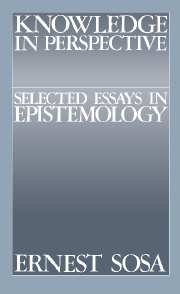Book contents
- Frontmatter
- Contents
- Sources and acknowledgments
- Introduction: back to basics
- PART I WHAT IS KNOWLEDGE, AND HOW IS IT POSSIBLE?
- PART II THEORIES OF JUSTIFICATION
- PART III INTELLECTUAL VIRTUE AND EPISTEMIC PERSPECTIVE: A VIEW PRESENTED
- PART IV INTELLECTUAL VIRTUE IN PERSPECTIVE: THE VIEW DEVELOPED
- 13 Knowledge and intellectual virtue
- 14 Methodology and apt belief
- 15 Equilibrium in coherence?
- 16 Intellectual virtue in perspective
- Index
15 - Equilibrium in coherence?
Published online by Cambridge University Press: 08 January 2010
- Frontmatter
- Contents
- Sources and acknowledgments
- Introduction: back to basics
- PART I WHAT IS KNOWLEDGE, AND HOW IS IT POSSIBLE?
- PART II THEORIES OF JUSTIFICATION
- PART III INTELLECTUAL VIRTUE AND EPISTEMIC PERSPECTIVE: A VIEW PRESENTED
- PART IV INTELLECTUAL VIRTUE IN PERSPECTIVE: THE VIEW DEVELOPED
- 13 Knowledge and intellectual virtue
- 14 Methodology and apt belief
- 15 Equilibrium in coherence?
- 16 Intellectual virtue in perspective
- Index
Summary
The method of reflective equilibrium aims to maximize two factors in one's beliefs: harmonious coherence, and plausibility of content. Analytic philosophy has long paid deference to these factors, for instance in its use of the counterexample, which attacks a principle as incoherent with the plausible (by one's lights). A critique of this tradition has recently appeared, and it shall be my main objective here to assess its merits. An appendix will apply our results to issues of moral relativism and rationality.
EPISTEMOLOGIES IN CONFLICT
Radical methodism is opposed to narrow reflective equilibrium. Karl Popper champions such methodism, Nelson Goodman such equilibrium. This opposition leads to a more moderate equilibrium, wide rather than narrow, in a sense to be explained.
Methodism
“Science is justified by means of induction on the basis of observation and experience.” This has been widely accepted and is widely accepted today. According to Popper, nevertheless, to think thus is a grave error, for as Hume showed, no supposed inductive reasoning is of any value. Popper reasons that “ … theories can never be inferred from observation statements, or rationally justified by them.” For “ … induction cannot be logically justified” (Popper, 42). That is to say, the fact that a theory T has been induced from certain data does not justify accepting T, since it does not ensure that T is true.
- Type
- Chapter
- Information
- Knowledge in PerspectiveSelected Essays in Epistemology, pp. 257 - 269Publisher: Cambridge University PressPrint publication year: 1991
- 3
- Cited by



